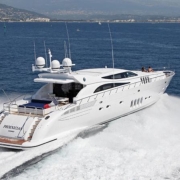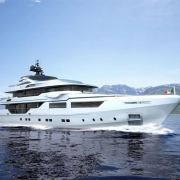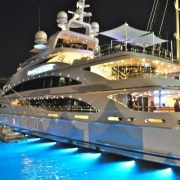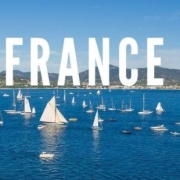New Maritime Cruise Agreement onboard a Yacht instead of Charter Agreement?
17 July 2017


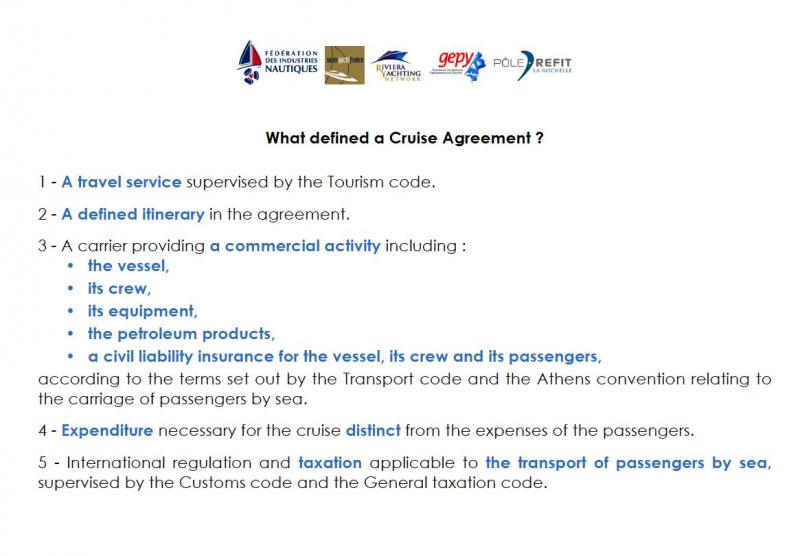
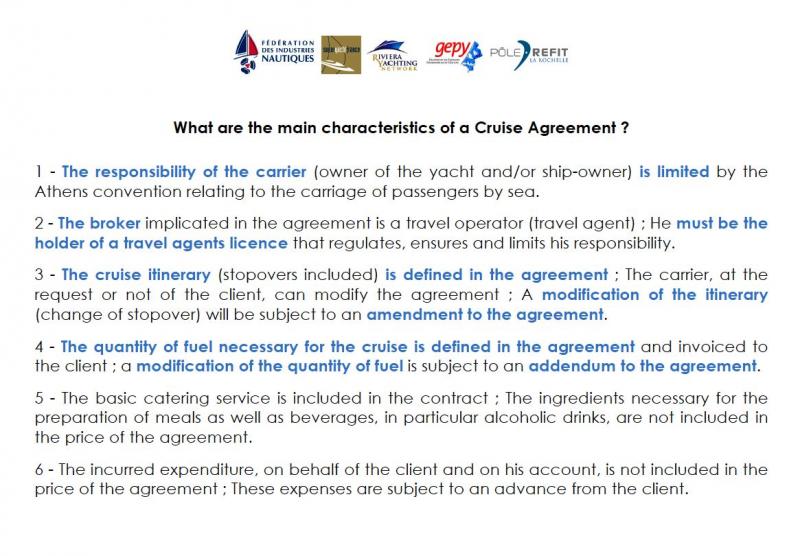
The French Federation of Nautical Industries (FIN), offers the yachting industry a new contractual framework to operate this activity safely, which could eventually replace – for yacht charters embarking in France – the MYBA Charter Agreement, very popular in our activity. This new Maritime Cruise Agreement represents, for yacht owners and charterers, several advantages in terms of taxation, which we describe in this article. It is also possible to download its terms and conditions in PDF with links below.
The aim of the FIN is to defend, represent and promote the French nautical sector, in France and internationally. It has a large number of members, grouped around all the professions of the industry and nautical services, representing more than 80% of the turnover in the business.
FIN is the privileged interlocutor of the regional, national and European authorities, the Federation assists and advises companies in the legal, social, economic and technical fields. It has a role of informing the general public and the media, in particular as regards the evolution of market trends.
On the international level, the FIN is actively involved in the evolution of the nautical sector. It is a founding member of the European Water Boating Industry Federation; whose main role is to represent and defend the interests of European nautical industries. FIN is also a member of the International Council of Marine Industry Associations (ICOMIA), the international grouping of national federations of nautical industries.
What defines a Maritime Cruise Agreement?
- A travel service supervised by the Tourism code.
- A defined itinerary in the agreement.
- A carrier providing a commercial activity including:
- a vessel,
- its crew,
- its equipment(s),
- fuel(s) (petroleum products),
- a civil liability insurance for the vessel, its crew and its passengers, according to the terms set out by the Transport code and the Athens convention relating to the carriage of passengers by sea.
- Expenses necessary for the cruise different from the passenger’s expenses.
- International regulation and taxation applicable to the transport of passengers by sea, supervised by the French Customs code and the General taxation code.
What are the main characteristics of a Maritime Cruise Agreement?
- The responsibility of the carrier (owner of the yacht and/or ship-owner) is limited by the Athens convention relating to the carriage of passengers by sea.
- The broker involved in the agreement is a travel operator (travel agent); He must be the holder of a travel agent licence that regulates, ensures and limits his responsibility.
- The cruise itinerary (stopovers included) is defined in the agreement; The carrier, at the request or not of the charterer, can modify the agreement; A modification of the itinerary (change of stopover) will be subject to an amendment to the agreement.
- The quantity of fuel necessary for the cruise is defined in the agreement and invoiced to the charterer; a modification of the quantity of fuel is subject to an addendum to the agreement.
- The basic catering service is included in the contract; The ingredients necessary for the preparation of meals as well as beverages, in particular alcoholic drinks, are not included in the price of the agreement.
- The incurred expenses, on behalf of the charterer and on his account, are not included in the price of the agreement; These expenses are subject to a down-payment from the client.
What is the Value Added Tax (VAT) on a Maritime Cruise Agreement?
- Embarkation and disembarkation in ports located in two different countries whether they are located or not in the European Union,
or
Embarkation and disembarkation in ports located in France with at least one identified stopover in another country.
Exemption of VAT, VAT = 0 % - Embarkation and disembarkation port located in France with exclusive navigation in French territorial waters.
Transport VAT = 10 % - Embarkation and disembarkation port located in France with partial navigation out of French territorial waters.
The part of the price corresponding to the navigation in French territorial waters will be subject to transport VAT = 10%
What is the taxation on fuel with a Maritime Cruise Agreement?
- The Maritime Cruise Agreement (1) regulates the services against payment carried out by a yacht fulfilling the commercial activity criteria.
- If the vessel is registered in a commercial registry (2) and has a permanent crew (3), upon presentation of a Maritime Cruise Agreement (1), fuel will be supplied exempt from the Interior Tax on the Consumption of Energetic Products (TICPE).
- If the vessel is registered in a commercial registry (2), has a permanent crew (3), measures more than 15 metres (4) and issues a certificate of compliance with the conditions of application of exemptions from VAT (5) certifying that at least 70 % of its commercial itineraries have left French territorial waters the previous year, upon presentation of a Maritime Cruise Agreement (1) , fuel will be supplied exempt of Value Added Tax (VAT) and also exonerated from the Interior Tax on the Consumption of Energetic Products (TICPE).
PDF Documents and specificities for tax exemptions:
(1) Maritime Cruise Agreement – (2) Commercial registry – (3) Permanent crew – (4) Vessel over 15 metres – (5) Certification of compliance with the conditions of application of VAT exemptions – (6) General Terms of the Maritime Cruise Agreement.
Allied Yachting will propose from now on, this new Maritime Cruise Agreement to make the Boat Rentals and Yacht Charters of its fleet even more competitive for charterers and more advantageous for owners. We will also engage all necessary formalities to obtain the Travel Agent license required. Please don’t hesitate to contact us for more information.

